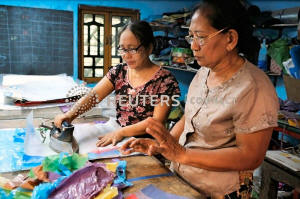The house that trash built: Myanmar start-up turns clutter to
handicrafts
 Send a link to a friend
Send a link to a friend
 [March 05, 2020]
By Zaw Naing Oo [March 05, 2020]
By Zaw Naing Oo
YANGON (Reuters) - From a distance, ChuChu
Design, a single-storey building across the river from Myanmar’s
bustling commercial capital, looks like any other on the impoverished
outskirts of the city.
But on closer inspection, the roof has been fashioned from old tyres,
the walls are made of glass bottles and the lampshades from melted
plastic, all items upcycled by the social enterprise as part of a
mission to educate people about waste.
ChuChu – named after the Burmese for “plastic house” – sells handicrafts
and fashion products recycled from the thousands of tonnes of trash
dumped in Yangon every day.
The design of the house is intended as a statement about waste, said
68-year-old Wendy Neampui, the managing director of the business, which
she founded in 2014 with the help of Italian non-profit organization
Cesvi.

“I wanted to transform trash from an ugly landfill site into beautiful
items,” she said, as she stitched together plastic sheets to be ironed
into a colourful patchwork bottle holder, a technique she learned from
the internet.
Dozens of designers have been trained up and now work in the business,
crafting everything from wallets made out of potato chip packets to
laptop covers made from cement bags.
“Our project … is not only to work on making beautiful things from
trash, but also to educate people that trash can be a decoration in the
home,” she said.
The Southeast Asian city’s government says more than 2,500 tonnes of
trash are thrown out every day by the 5 million or so people living and
working there.
Much of it ends up dumped on roads and in waterways, as city services
struggle to keep pace with rapid urbanization.
[to top of second column]
|

Wendy and Hla Hla Nwe use recycled plastic waste to make various
products at the shop Chuchu House in Dalla township, Yangon,
Myanmar, February 18, 2020. REUTERS/Ann Wang

Many people burn their trash in the street, contributing to air
pollution - the city's air quality is among the worst in the world.
In Dala township, the suburb where ChuChu is located, the streets
are littered with mountains of rotting garbage.
It’s a struggle to persuade people to buy products made from
scavenged items, Wendy Neampui said, so most of the items they make
end up in souvenir shops targeting tourists.
The aim is that people buy not because the products are a curiosity
but for their own value, said Friedor Jeske, a German waste
management specialist who is also a managing director at ChuChu.
“That’s a little bit of a tough goal,” he said. “But we are getting
there … slowly.”
Wendy Neampui said she had no illusions the enterprise would solve
the city’s trash problem. But it's a step in the right direction.
“With this technique, I can help save the environment and earn a
living,” she said. “That is my ambition.”
(Reporting by Zaw Naing Oo; Editing by Robert Birsel)
[© 2020 Thomson Reuters. All rights
reserved.] Copyright 2020 Reuters. All rights reserved. This material may not be published,
broadcast, rewritten or redistributed.
Thompson Reuters is solely responsible for this content.
 |